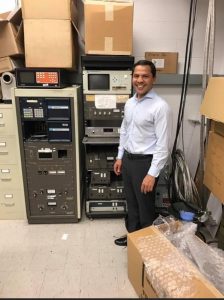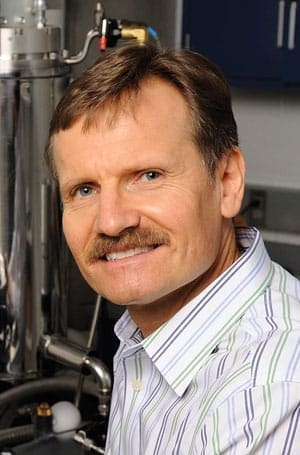Now the chair of the Physics and Astronomy Advisory Council, Noor Islam, A&S ’97 (MA), ’00 (PhD), has a photo from his early days as a member. In it, he stands alongside an unplugged spectrometer — now horribly obsolete, he says — once used to probe the magnetism of materials grown in Cal Walker’s lab. Walker, who led Islam’s graduate work, retired from Johns Hopkins in 2001 after nearly 40 years on faculty.

One of Islam’s former professors, Collin Broholm, had led him around the space after one of Islam’s first council meetings and snapped the photo. Broholm’s team now uses the lab to build crystalline solids that are much thicker than the atomically thin layers of atoms, or films, Islam studied as a graduate student.
“I was quite excited to see that a person I knew from fairly long ago was now part of our council,” says Broholm, who serves as the Gerhard H. Dieke Professor in the William H. Miller III Department of Physics and Astronomy. “The amazing thing with the way that the memory works is that when you meet a person so far in the past, it’s difficult to appreciate how long has actually transpired. But there he was, and it seemed that it was just yesterday.”
Shortly after the impromptu tour, Broholm says he was “very surprised and extremely grateful” to learn his lab had a new supporter.
“Dr. Broholm and I knew each other very well when I was a grad student. I found his work with neutron scattering fascinating,” Islam says. “When I decided to get involved with the department and choose where I would lend my support, that was the obvious choice.”
Islam’s gifts provide flexible spending for Broholm’s research into topological magnetic semi-metals — a material that has the property of a ferromagnet, the kind of magnet that sticks to a refrigerator, but is actually anti-ferromagnetic, with atomic magnetic moments arranged in a pattern that very nearly cancels the net magnetic fields. The new material has long-term implications for information storage and other aspects of information technology, like artificial intelligence (AI).

Fundamentally, AI arises as a consequence of having access to very large amounts of information and the ability to carry out calculations that make use of it, Broholm explains. His work not only examines the information storage capabilities of the magnetic semi-metal, but also its speed and energy efficiency. Broholm’s team is collaborating with Professor Satoru Nakatsuji, who holds appointments at both Hopkins and the University of Tokyo.
“It was quite helpful to have the flexible funding that Noor Islam generously provided, because when you have a discovery and you have work you’d like to do effectively, it’s good to have the ability to act rapidly for scientific progress,” Broholm says.
The flexible funding from Islam, for example, helped to support a thin film sample storage system that was needed in preparation for neutron scattering experiments on the topological magnetic semi-metals. Broholm adds that the funding also helped to enable the collaboration with Nakatsuji at an important juncture.
“Alumni giving is something we really value,” Broholm says. “For those of us who’ve been at Hopkins for a long period of time, it’s especially wonderful to see that the work the department did had impact on people’s lives, and that they are interested and able to give back to the university.”
For Islam, supporting the department was an easy choice. He came to the United States from Pakistan as an undergraduate, and much of his education was funded by scholarships and fellowships. He says he not only left Hopkins with a degree, but with deep, long-lasting friendships — and great appreciation for his professors at Hopkins, including Broholm.
“Many of us have benefited from the contributions, whether it’s monetary or time or something else, of others,” Islam says. “It behooves all of us to make our own contributions. If I can make it a little easier for somebody else, well, I would love to do that.”
Topics: Alumni, Faculty and Staff, Research, Krieger School of Arts and Sciences, Fuel Discovery, Support Scholars